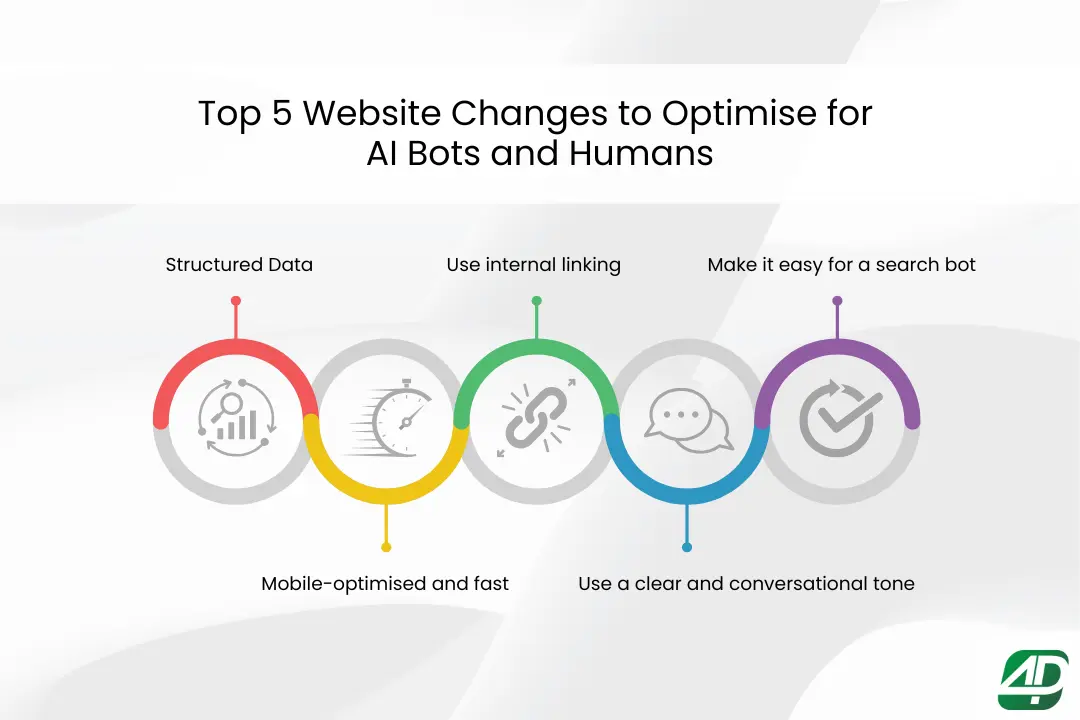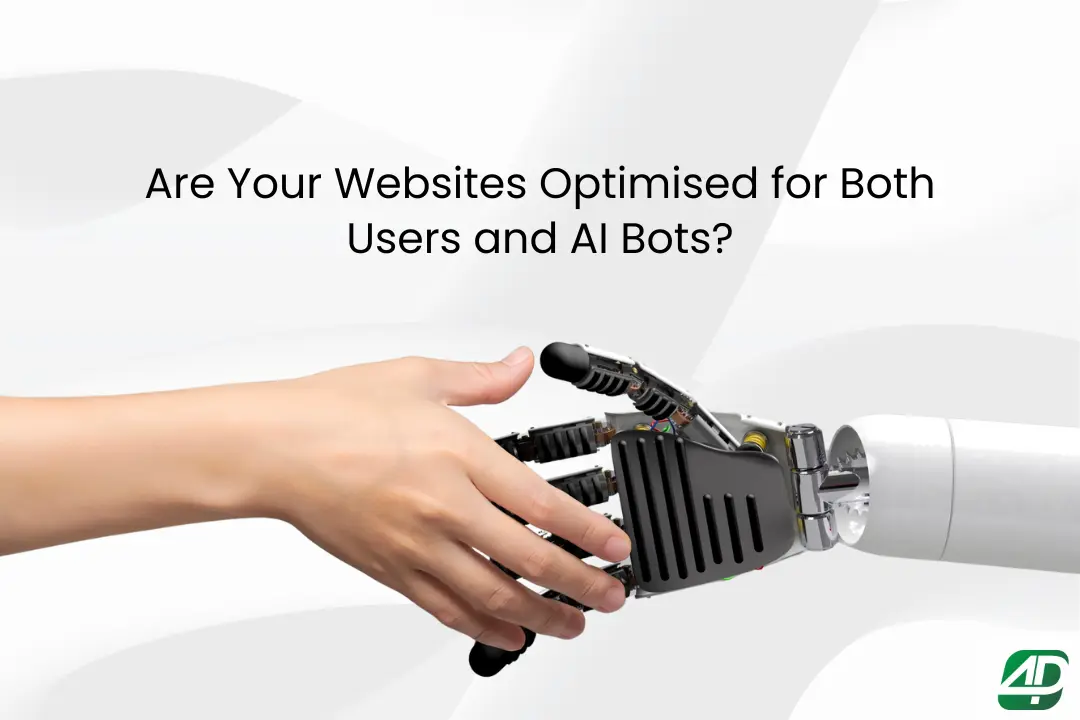Introduction
Have you recently come across the exponential drop in your website's ranking? Then you are not the only one facing these issues. As users now prefer AI summaries over Google search, this drops visits to your websites.
In an AI-driven world, we must do website optimisation for both AI bots and human users. This blog will guide you on improving website performance for AI while enhancing user experience.
Highlights:
Human vs. AI: Two very different audiences
In today's era, we need to build user-friendly websites that work for both people and machines. Which means we should start thinking of SEO as having two audiences:
-
Humans want content which answers queries, easy navigation, and fast-loading pages.
-
AI bots that scan your site to decide if it’s worth showing to people in AI summaries.
The challenge is finding a balance between the two. But the good news? It's doable.
Top 5 website changes to optimise for AI bots and humans

Let’s explore the top 5 changes you can make to optimise your website for both AI bots and human users.
1. Structured data :
You might have heard of terms like “schema markup” or “structured data.” Sounds complicated, right? In simplified terms, it’s like putting name tags on everything in your house so a robot can easily locate things.
For instance, if you’re a logistics firm, using the right tags for services, locations, and industries can drastically improve how you show up in AI-powered search.
When we add structured data to your website, we’re telling search engines, “Hey, this is a product,” or “This is a review,” or “This is an FAQ section.” It helps your content get featured in AI summaries and featured snippets and increases website performance.
2. Mobile-optimised and fast :
We hate waiting for slow websites. So do AI bots. If your site takes more than 3 seconds to load, most users and even bots are likely to leave. Mobile-first indexing is now standard, meaning Google and AI bots judge your website based on how it performs on a phone.
Writing for people is a must, but if a bot can’t understand what your page is about, it won't rank. That's where SEO best practices come in.
For fast loading of your website, compress your images, use a responsive design, and avoid heavy scripts. Because a slow, cluttered site is a red flag for both humans and bots.
3. Use a clear and conversational tone :
Gone are the days when stuffing keywords worked. Today, your content should feel like a natural conversation. Instead of writing, “B2B SEO agency in Mumbai offers solutions for industrial clients”, write: “Looking for a B2B SEO agency that understands your industry? Let’s talk.”
This improves the user experience and higher retention rate. Incorporate this B2B content marketing funnel for higher conversion metrics.
4. Use internal linking :
AI bots follow your internal links to understand how your site is connected. Humans use those same links to navigate and find what’s useful. Think of your website like a tour guide. You don’t want to dump people in a room and walk away; you want to lead them from room to room gently.
If you're writing about “SEO services for chemical companies,” link naturally to your case studies or pricing pages. Good linking improves user flow and helps bots crawl your website more effectively.
5. Make it easy for search bots :
AI bots are trying to find the best answer for a user’s query. So before you publish anything, ask yourself: If I were a search engine, would I recommend this page to someone asking that question?
Use the below tricks for AI bots to easily crawl the information on your website.
-
FAQs (they help voice searches and AI summaries)
-
Headings that clearly say what each section is about
-
Inserting AI chatbots for AI bot optimisation
-
Short answers to popular queries at the top of your content
-
Add strategic internal links with relevant anchor text and clear CTAs.
With the above list, incorporate the best practices into your website to optimise it for search engine optimisation.
How The 4p Solutions can help you
We know all this might sound a bit overwhelming, especially if you’re not technical. But that’s where The 4P Solutions comes in.
We specialise in helping B2B brands, from chemical companies to logistics firms, building websites that perform well with both AI bots and human users.
Our team doesn’t just throw SEO terms around; we help you apply them, whether it’s:
-
Adding structured data the right way
-
Creating mobile-optimised layouts
-
Writing content that’s engaging but also bot-friendly
-
Organising your website so it’s easy to crawl (and easy to love)
If you're looking for a B2B SEO agency that understands your industry and the future of AI-powered search, we're ready to help. Connect with The 4p Solutions, a b2b digital marketing agency, at mktg@the4psolutions.com or call us at +91 85919 37177 to learn more.
Conclusion
The future of SEO isn’t just about ranking on Google anymore. It’s about getting found by people and bots in a world full of AI summaries, voice search, and algorithm changes.
If your website isn’t prepared, you’re losing traffic, even if your content is excellent. At The 4P Solutions, we are a web development services provider that can help you build a user-friendly and AI-optimised website. A website that ranks, converts, and scales with your business goals. Let’s stop chasing traffic and start building visibility that works in 2025 and beyond.
FAQ’s:
SEO for humans focuses on readability, design, and engaging content. SEO for bots ensures your site structure, code, and metadata are optimised so bots can understand and rank your content.
AI-generated summaries (like Google’s SGE or ChatGPT answers) often pull key info from your site and display it without a click, leading to lower visits unless your site is highly optimised.
You can use tools like Google Search Console, Screaming Frog, or SEO audits to check how bots view your site. Look for crawlability, structured data, and mobile performance.
Not necessarily. Some CMS platforms offer plugins, but having an expert ensures proper implementation and helps you get noticed by AI and search engines.
Typically, you’ll start noticing improvements in 1-3 months, depending on the changes made and your industry competition.

